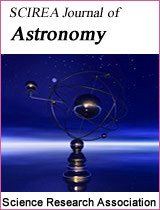SCIREA Journal of Astronomy is an
international, scientific peer-reviewed open access journal
published online by SCIREA.
Open Access
free for readers, with article processing charges (APC)paid by authors or their
institutions.
High visibility: Indexed in the Google Scholar
and other databases.
Rapid publication:
manuscripts are peer-reviewed and a first decision provided to
authors approximately 20 days after submission; acceptance to
publication is undertaken in 5 days.
Recognition of reviewers:
reviewers who provide timely, thorough peer-review reports receive
vouchers entitling them to a discount on the APC of their next
publication in any SCIREA journal, in appreciation of the work
done.
Volume 5, Issue 1, February 2023
Open Access
Yi-Fang Chang
Abstract: Based on Dirac negative energy, Einstein mass-energy relation and principle of equivalence, we propose the negative matter as the simplest model of unified dark matter and dark energy. All theories are known, only mass includes positive and negative. Because there is repulsion between positive matter and negative matter, so
Open Access
Chernobay Ivan Alesandrovich
Abstract: The work relates to the creation of new methods and instruments for observational astronomy, in particular to gravitational astrophysics. The ultrasonic gravitational method for obtaining information about such exotic objects as neutron pulsar stars has been developed and successfully tested. Gravitational waves are detecte
Volume 4, Issue 1, February 2022
Open Access
Flavio Barbiero
Abstract: All astronomical bodies originate inside clouds of gas and dust, therefore there should be a common process that leads to their condensation. A galactic cloud normally has some turbulence and therefore a gradient of speeds from point to point. Thanks to it, a vortex originates that rakes the material of the surrounding clou
Open Access
Flavio Barbiero
Abstract: The dark matter is a mysterious kind of matter with no mass, no inertia and none of the other characteristics that we attribute to matter, but for the fact that it exerts a force that prevents the stars of the arms of the spiral galaxies to disperse into space. A force that, to achieve this result, should decrease not with

